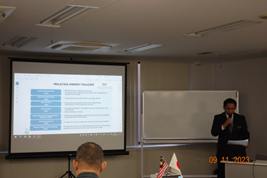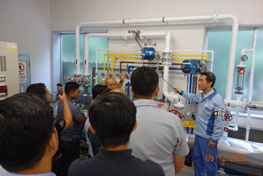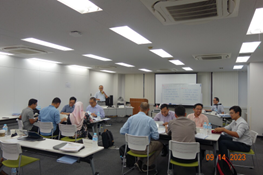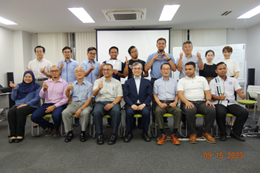ECCJ held the 10th energy conservation invited Training in Japan (BECMY10) for Malaysia
<Meeting>
Under the instruction and financial support of the Agency for Natural Resources and Energy (ANRE), the Energy Conservation Center, Japan (ECCJ) has been implementing a bilateral energy conservation cooperation project with Malaysia which also continued in FY2023. Measures against COVID-19 have been relaxed in this fiscal year, allowing trainees to be invited for training in Japan without requiring them to wear masks. Training for a total of 10 persons consisting of representatives from Malaysian government and related institutions and from three private companies to realize the formulation of a heat-related energy audit training system was conducted and completed without problems during the five-day period from September 11 to 15.
 |
 |
|
Presentation of Country Report |
Practical training on combustion furnaces |
 |
 |
|
Simulated energy audit practice (2 groups) |
Group photograph of participants |
(1) Malaysian side: Three representatives from the Ministry of Natural Resources, Environment and Climate Change (NRECC), two representatives from the Sustainable Energy Development Authority (SEDA), two representatives of the Energy Commission (EC), and one person from each of three private companies related to the pilot projects, making a total of ten persons.
(2) Japanese side: Seven persons from the ECCJ International Cooperation Division, two persons from Nippon Steel Technology Co., Ltd., one person from TLV Co., Ltd. and three persons from other companies.
2. Overview of training:
(1) Objective: With regard to the energy conservation laws which are to be newly institutionalized in Malaysia, heat facility-related lectures, energy conservation practical training and simulated energy audit practice are given as part of EE&C capacity building of related persons and trainers for the Energy Auditor Training System in the heat-related field.
(2) Opening and closing ceremony greetings: Greetings were given by representatives from METI, NRECC and ECCJ.
(3) Training contents: Training was conducted over a total of five days, consisting of lectures relating to heat facilities (①) given on one day, practical training (②) using the facilities for energy conservation training on two days and simulated energy audit practice (③) on two days.
① General heat-related facilities: Boilers, Cogeneration systems, Heat pumps and Cement kilns.
② Practical training: (Heat) Combustion furnaces (training by Nippon Steel Technology), Steam traps (training by TLV) (Electricity) Pumps and Compressors (training by Nippon Steel Technology).
③ Simulated energy audit practice: For case studies in both the factory and building sectors, group work was implemented regarding the identification of issues and the formulation of measures responding to these issues together with understanding the measures’ quantitative effects, and presentations were made.
(4) Evaluation: During the practical training, hands-on training including the operation and reading of valves and measuring instruments was given while operating the equipment described in ② above. Additionally, in the simulated energy audit practice, trainees identified issues as an advance assignment before coming to Japan, enthusiastic discussions also took place during the group work, and there were lively exchanges of opinions during the presentations. Comments were received from trainees saying that the contents of the training this time had exceeded their expectations.

